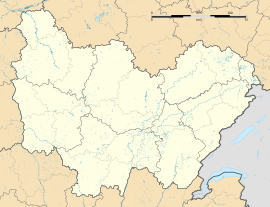Poligny (French pronunciation: [pɔliɲi] ) is a commune in the Jura department in Bourgogne-Franche-Comté in eastern France.[3]
Poligny | |
|---|---|
 A general view of Poligny | |
| Coordinates: 46°50′12″N 5°42′31″E / 46.8367°N 5.7086°E | |
| Country | France |
| Region | Bourgogne-Franche-Comté |
| Department | Jura |
| Arrondissement | Dole |
| Canton | Poligny |
| Intercommunality | CC Arbois, Poligny, Salins - Coeur du Jura |
| Government | |
| • Mayor (2020–2026) | Dominique Bonnet[1] |
Area 1 | 50.22 km2 (19.39 sq mi) |
| Population (2021)[2] | 4,011 |
| • Density | 80/km2 (210/sq mi) |
| Time zone | UTC+01:00 (CET) |
| • Summer (DST) | UTC+02:00 (CEST) |
| INSEE/Postal code | 39434 /39800 |
| Elevation | 252–626 m (827–2,054 ft) |
| 1 French Land Register data, which excludes lakes, ponds, glaciers > 1 km2 (0.386 sq mi or 247 acres) and river estuaries. | |
The town stands at the foot of the first plateau of the Jura region, with limestone cliffs rising to its east and south, and a steephead valley leading to the village of Vaux-sur-Poligny to the east. On the cliffs to the east is a notable cave, known as "Le Trou de la Lune" (the Moonhole); on the cliffs to the south is a large cross, the "Croix du Dan". A network of hiking trails surrounds the town and provide routes to both these viewpoints, and the GR 59 long distance footpath runs through the town.
First Empire general Jean-Pierre Travot was born in Poligny; a statue in his honour stands in the principal square of the town, the Place des Déportés, and a road is named after him.
Poligny is served by the railway line from Besançon to Lons-le-Saunier.
The town is recognised as the "Capital of Comté", with a third of the region's production of this much-loved cheese being aged in the town's cellars. The town is also surrounded by vineyards, and is home to a number of independent wine producers as well as a cooperative.
Population
edit
|
| ||||||||||||||||||||||||||||||||||||||||||||||||||||||||||||||||||||||||||||||||||||||||||||||||||||||||||||||||||
| Source: EHESS[4] and INSEE (1968-2017)[5] | |||||||||||||||||||||||||||||||||||||||||||||||||||||||||||||||||||||||||||||||||||||||||||||||||||||||||||||||||||
Gallery
edit-
Collégiale St.Hippolyte
-
Tower of Paravis
-
Tower of the "Sergenterie"
-
Le Moon hole
-
La "Roche Percée"
See also
editReferences
edit- ^ "Répertoire national des élus: les maires". data.gouv.fr, Plateforme ouverte des données publiques françaises (in French). 2 December 2020.
- ^ "Populations légales 2021" (in French). The National Institute of Statistics and Economic Studies. 28 December 2023.
- ^ INSEE commune file
- ^ Des villages de Cassini aux communes d'aujourd'hui: Commune data sheet Poligny, EHESS (in French).
- ^ Population en historique depuis 1968, INSEE
External links
edit- . Encyclopædia Britannica (11th ed.). 1911.




